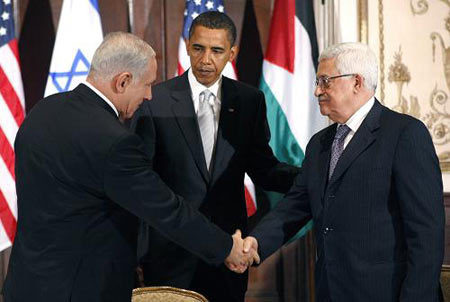By David Harris
When Israeli and Palestinian negotiators meet US special envoy George Mitchell for more talks next week, it is by no means clear what they will be discussing. Tuesday's tripartite meeting between US, Israeli and Palestinian leaders left many questions unanswered.
The US President Barack Obama's administration did make plain one thing that had not been obvious until Tuesday: It did not see its demand for an Israeli settlement construction freeze as "a precondition" to the resumption of Israeli-Palestinian negotiations.
 |
|
US President Barack Obama watches Israeli Prime Minister Benjamin Netanyahu (L) and Palestinian President Mahmoud Abbas (R) shake hands during a trilateral meeting in New York September 22, 2009. [Xinhua] |
Obama met with Israeli Prime Minister Benjamin Netanyahu and Palestinian President Mahmoud Abbas separately before they sat down together. Analysts said that the fact that Obama had to speak with each man alone suggested that there was no agreement between them in the run-up to the tripartite talks.
Normally, agreements are reached by diplomats prior to summit meetings, said Adam Keller, the spokesman of Gush Shalom, a dovish Israeli movement. The lack of common ground did not bode well for Tuesday's parley, he added.
Everyone gained something?
However, all meetings that involving the US president must show some results, said Gilbert Kahn, a professor of political science at Kean University in New Jersey.
"These meetings require that everyone walks away with something. Otherwise, they generally do not, in fact cannot, take place," he added, noting that all the three leaders gained from the talks.
Obama pushed very hard for this meeting even though it turned out to be nothing more than a photo-op. He needed the meeting to distinguish himself from the previous administration and to demonstrate his continued personal commitment to the peace process, said Kahn.
Netanyahu and Abbas needed to give their host something while confirming their positions. Israel still insisted on continuing current construction plans in the Palestinian territories, and the Palestinians stuck to their demand for a total freeze on settlement activities.
"What appears to have happened is that in public at least everyone appears to have come away agreeing to meet again, while at the same time neither side appeared to have reneged on their prior commitments," Kahn said.
What next??
The next stage in the US plan to get the sides talking in earnest will take place in a week when negotiators from both parties meet to discuss the way forward. These discussions will not be negotiations, but talks about negotiations.
In the interim, Palestinians are expected to make more statements insisting on a settlement freeze and facing questions about why they agreed to resume this process when their basic demand for a cessation of construction work in the West Bank and East Jerusalem had not been adhered to.
Hamas, the rival Palestinian faction to Abbas' Fatah movement, has already accused the Palestinian National Authority (PNA), headquartered in the West Bank city of Ramallah, of caving in and showing their weaknesses over the settlement issue.
"Abbas' decision to attend the meeting also proved that the Ramallah authority was covering up for the 'Zionist occupation's crimes' and that his anti-occupation statements were mere propaganda," Hamas' spokesman Sami Abu Zuhri said on an organization website.
Against such a backdrop, Keller said that the first thing that must be done for the peace process to move forward is a total settlement freeze.
"If negotiations are going to begin without Netanyahu's agreement to freeze settlements, you have a negative development, and if you have a partial settlement freeze, you have no settlement freeze," he added.
Obama made it clear to both of his guests on Tuesday that he wanted to see swift progress towards a two-state solution. Analysts said that the US president has showed signs that he would not stand for any games and would likely be ready to use the stick as well as carrot when dealing with Netanyahu and Abbas.
(Xinhua News Agency September 24, 2009)